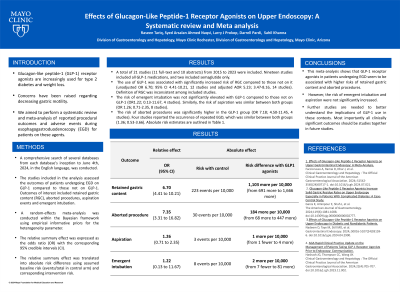Sunday Poster Session
Category: General Endoscopy
P0669 - Effects of Glucagon-Like Peptide-1 Receptor Agonists on Upper Endoscopy Outcomes: A Systematic Review and Meta-Analysis
Sunday, October 27, 2024
3:30 PM - 7:00 PM ET
Location: Exhibit Hall E


Raseen Tariq, MBBS
Mayo Clinic
Rochester, MN
Presenting Author(s)
Raseen Tariq, MBBS, Syed Arsalan Ahmed. Naqvi, MD, Larry J. Prokop, , Darrell S. Pardi, MD, MS, Sahil Khanna, MBBS, MS
Mayo Clinic, Rochester, MN
Introduction: Glucagon-like peptide-1 (GLP-1) receptor agonists are increasingly used for type 2 diabetes and weight loss. Concerns have been raised about their effect on gastric motility. We aimed to perform a systematic review and meta-analysis of procedural outcomes and adverse events during esophagogastroduodenoscopy (EGD) for patients on these agents.
Methods: A comprehensive search of several databases from each database's inception to June 4th, 2024, in the English language, was conducted. The studies included in the analysis assessed the outcomes of patients undergoing EGD on GLP-1 compared to those not on GLP-1. Outcomes of interest included retained gastric content (RGC), aborted procedures, aspiration events, emergent intubation and need for repeat EGD. A random-effects meta-analysis was conducted within the Bayesian framework using empirical informative priors for the heterogeneity parameter. The relative summary effect was expressed as the odds ratio (OR) with the corresponding 95% confidence intervals (CI). The relative summary effect was translated into absolute risk difference using assumed baseline risk (events/total in control arm) and corresponding intervention risk.
Results: A total of 21 studies (11 full-text and 10 abstracts) from 2015 to 2023 were included. Nineteen studies included all GLP-1 medications, and two included semaglutide only. The use of GLP-1 was associated with significantly increased risk of RGC compared to those not on it (unadjusted OR 6.70; 95% CI 4.41-10.21, 12 studies and adjusted OR (AOR) 5.23; 3.47-8.16, 14 studies). The definition of RGC was inconsistent among included studies. The risk of emergent intubation (OR 1.22; 0.13-11.67, 4 studies) and aspiration (OR 1.26; 0.71-2.35, 8 studies) were similar between groups. The risk of aborted procedures was significantly higher in the GLP-1 group (OR 7.18; 4.50-11.45, 4 studies) although the occurrence of repeated EGD was similar (1.36; 0.53-3.66, 4 studies). Absolute risk estimates are outlined in Table 1.
Discussion: This meta-analysis shows that GLP-1 receptor agonist use in patients undergoing EGD is associated with higher risks of retained gastric content and aborted procedures. However, the risk of emergent intubation and aspiration were not significantly increased. Further studies are needed to better understand the implications of GLP-1 use in this context. Most importantly, all clinically significant outcomes should be studies together in future studies.
Note: The table for this abstract can be viewed in the ePoster Gallery section of the ACG 2024 ePoster Site or in The American Journal of Gastroenterology's abstract supplement issue, both of which will be available starting October 27, 2024.
Disclosures:
Raseen Tariq, MBBS, Syed Arsalan Ahmed. Naqvi, MD, Larry J. Prokop, , Darrell S. Pardi, MD, MS, Sahil Khanna, MBBS, MS. P0669 - Effects of Glucagon-Like Peptide-1 Receptor Agonists on Upper Endoscopy Outcomes: A Systematic Review and Meta-Analysis, ACG 2024 Annual Scientific Meeting Abstracts. Philadelphia, PA: American College of Gastroenterology.
Mayo Clinic, Rochester, MN
Introduction: Glucagon-like peptide-1 (GLP-1) receptor agonists are increasingly used for type 2 diabetes and weight loss. Concerns have been raised about their effect on gastric motility. We aimed to perform a systematic review and meta-analysis of procedural outcomes and adverse events during esophagogastroduodenoscopy (EGD) for patients on these agents.
Methods: A comprehensive search of several databases from each database's inception to June 4th, 2024, in the English language, was conducted. The studies included in the analysis assessed the outcomes of patients undergoing EGD on GLP-1 compared to those not on GLP-1. Outcomes of interest included retained gastric content (RGC), aborted procedures, aspiration events, emergent intubation and need for repeat EGD. A random-effects meta-analysis was conducted within the Bayesian framework using empirical informative priors for the heterogeneity parameter. The relative summary effect was expressed as the odds ratio (OR) with the corresponding 95% confidence intervals (CI). The relative summary effect was translated into absolute risk difference using assumed baseline risk (events/total in control arm) and corresponding intervention risk.
Results: A total of 21 studies (11 full-text and 10 abstracts) from 2015 to 2023 were included. Nineteen studies included all GLP-1 medications, and two included semaglutide only. The use of GLP-1 was associated with significantly increased risk of RGC compared to those not on it (unadjusted OR 6.70; 95% CI 4.41-10.21, 12 studies and adjusted OR (AOR) 5.23; 3.47-8.16, 14 studies). The definition of RGC was inconsistent among included studies. The risk of emergent intubation (OR 1.22; 0.13-11.67, 4 studies) and aspiration (OR 1.26; 0.71-2.35, 8 studies) were similar between groups. The risk of aborted procedures was significantly higher in the GLP-1 group (OR 7.18; 4.50-11.45, 4 studies) although the occurrence of repeated EGD was similar (1.36; 0.53-3.66, 4 studies). Absolute risk estimates are outlined in Table 1.
Discussion: This meta-analysis shows that GLP-1 receptor agonist use in patients undergoing EGD is associated with higher risks of retained gastric content and aborted procedures. However, the risk of emergent intubation and aspiration were not significantly increased. Further studies are needed to better understand the implications of GLP-1 use in this context. Most importantly, all clinically significant outcomes should be studies together in future studies.
Note: The table for this abstract can be viewed in the ePoster Gallery section of the ACG 2024 ePoster Site or in The American Journal of Gastroenterology's abstract supplement issue, both of which will be available starting October 27, 2024.
Disclosures:
Raseen Tariq indicated no relevant financial relationships.
Syed Naqvi indicated no relevant financial relationships.
Larry Prokop indicated no relevant financial relationships.
Darrell Pardi: AbbVie – Consultant. Applied molecular transport – Grant/Research Support. Finch – Grant/Research Support. Immunic – Consultant. Otsuka – Consultant. Pfizer – Grant/Research Support. Phantom Pharmaceuticals – Consultant. Seres – Consultant, Grant/Research Support. Takeda – Grant/Research Support. Vedanta – Consultant, Grant/Research Support.
Sahil Khanna: Ferring Pharmaceuticals, Inc. – Grant/Research Support. Finch – Grant/Research Support. Pfizer – Grant/Research Support. Probio Tech, LLC – Consultant. Rise – Consultant. Seres Therapeutics – Grant/Research Support. Takeda – Consultant. Vedanta – Grant/Research Support.
Raseen Tariq, MBBS, Syed Arsalan Ahmed. Naqvi, MD, Larry J. Prokop, , Darrell S. Pardi, MD, MS, Sahil Khanna, MBBS, MS. P0669 - Effects of Glucagon-Like Peptide-1 Receptor Agonists on Upper Endoscopy Outcomes: A Systematic Review and Meta-Analysis, ACG 2024 Annual Scientific Meeting Abstracts. Philadelphia, PA: American College of Gastroenterology.
